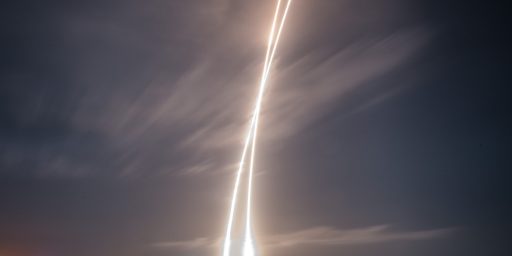Iraqi Nerve Gas for Sale to Terrorists — But Harmless?
Strange mixed news on the Iraq chemical weapons front.
BBC — Troops ‘foil Iraq nerve gas bid’
Poland’s defence ministry claims its troops in Iraq have thwarted an attempt by militants to buy a quantity of warheads containing nerve agents. The country’s military intelligence chief said troops had increased efforts to find the weapons when told they were on the market for about $5,000 each. Gen Marek Dukaczewski said an attack using warheads such as these was hard to imagine. But the US military said the agent was so deteriorated it posed no threat.
Gen Dukaczewski was commenting on last month’s recovery by Polish troops of 17 warheads for a 1980s Soviet-era rocket system. Tests indicated some warheads contain cyclosarin, more powerful than sarin, Polish officials say. But the US military said that while two of the rockets tested positive for sarin, traces of the agent were so small and deteriorated as to be virtually harmless. “These rounds were determined to have limited to no impact if used by insurgents against coalition forces,” a statement by the military said. Another 16 rockets found by the Polish troops were all empty and tested negative for any type of chemicals, it added, without explaining the discrepancy in numbers with the Polish version.
“We were mortified by the information that terrorists were looking for these warheads and offered $5,000 apiece,” he said. “An attack with such weapons would be hard to imagine. All of our activity was accelerated at appropriating these warheads.” The general said the ammunition had been buried in order to avoid it being discovered by UN weapons inspectors. They were located in a bunker in the Polish sector, but officials refused to reveal their exact whereabouts.
The former Iraqi regime of Saddam Hussein produced cyclosarin in the 1980s to fight Iran but was bound by UN resolutions following the 1991 Gulf War to destroy stocks and cease production. However, inconclusive searches by inspectors led the US to accuse Saddam Hussein of failing to surrender chemical and biological weapons and were cited as one of the reasons for the US-led invasion in 2003. In May this year, an artillery shell apparently filled with sarin exploded at a roadside near Baghdad but caused no serious injury.
Meanwhile, WaPo has a rather different take on what appears to be the same story: Chemicals Not Found in Iraq Warheads
Sixteen rocket warheads found last week in south-central Iraq by Polish troops did not contain deadly chemicals, a coalition spokesman said yesterday, but U.S. and Polish officials agreed that insurgents loyal to former Iraqi president Saddam Hussein and foreign terrorist fighters are trying to buy such old weapons or purchase the services of Iraqi scientists who know how to make them.
The Coalition Press Information Center in Baghdad said in a statement yesterday that the 122-milimeter rocket rounds, which initially showed traces of sarin, “were all empty and tested negative for any type of chemicals.” The statement came just hours after two senior Polish defense officials told reporters in Warsaw, based on preliminary reports, that the rocket rounds contained deadly sarin and that actions by the Polish unit in Iraq kept them from being purchased by militants fighting coalition forces.
Yesterday’s coalition release also said that two other 122-milimeter rounds, found by the Poles on June 16 with help from an Iraqi informer, tested positive for small quantities of sarin but were “so deteriorated” that they would have had “limited to no impact if used by insurgents against coalition forces.”
Confusing.




